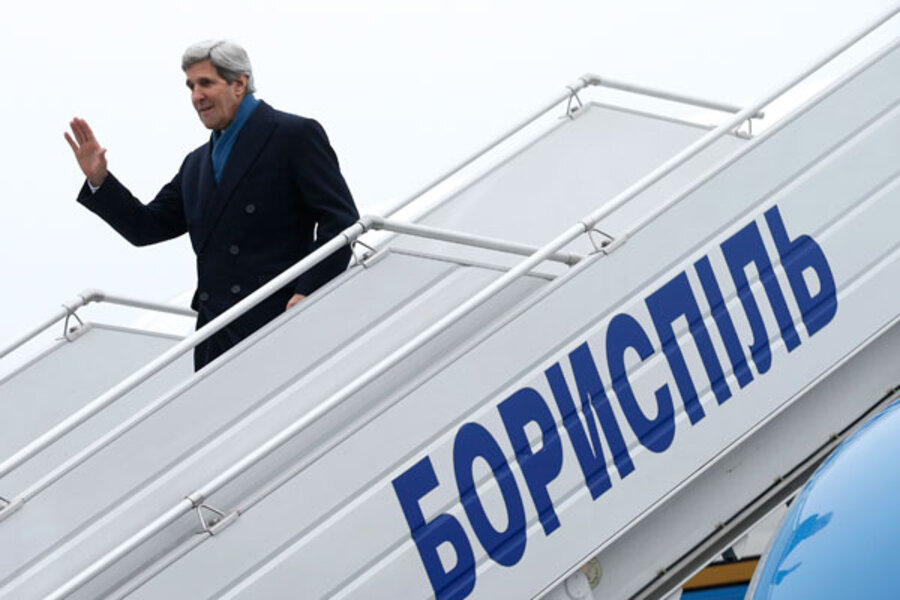US talks Russia sanctions, but would they make any difference?
Loading...
| Washington
President Obama is threatening to impose a range of sanctions on Russia to compel President Vladimir Putin to reverse course in Ukraine, and on Tuesday Secretary of State John Kerry unveiled in Kiev a $1 billion aid package to help the Ukrainian government stabilize and fight off the Russian bear.
Despite the tough language and pledge of punitive action from the Obama administration, it remains unclear just how persuasive US measures are likely to be with a Russia that is economically and geopolitically stronger than at any time since the collapse of the Soviet Union.
Two decades ago, the United States could pressure a retrenched and economically dependent Russia to take certain actions concerning the republics of the former Soviet empire, Russia scholars note. But today, the US ability to raise the “cost” for Russian actions is much more limited, says Fiona Hill, a former intelligence officer specializing in Russia who is now a senior fellow at the Brookings Institution in Washington.
That helps explain two points that Mr. Obama underscored in laying out his plan for dealing with Russia: First, US action must be coordinated with other Western partners, primarily European powers that have much more significant trade and economic ties with Russia than does the US. And second, US sanctions will focus on measures targeting what Obama called Russia’s “status in the world,” an area that is of keen importance to the world-image-conscious Mr. Putin.
The US accounts for only about 1 percent of Russian trade, so the US cannot expect to have significant economic influence. Post-Soviet Russia was beholden to Washington-influenced international financial institutions such as the World Bank and the International Monetary Fund, Ms. Hill notes, but those days are long over.
On the other hand, the European Union (EU) is a crucial trade partner for Russia and presumably could have much more influence with Moscow by imposing trade sanctions. But perhaps because of those close ties – and the fact that Western Europe depends on Russia for a chunk of its energy needs – Western European leaders have so far sounded a more cautious note than Obama about imposing sanctions.
The EU did issue a statement late Monday warning Moscow that EU-Russia relations would be set back if it did not quickly take steps to reduce tensions and reverse its course in Ukraine. But consultations among the foreign ministers of the 28-nation organization did not produce concrete measures, leaving most Europe analysts concluding that the EU remains wary of attempts to “isolate” Russia, as Obama suggested Monday.
The EU statement said that “in the absence of de-escalating steps by Russia” the bloc would proceed to consider unspecified “consequences” for EU-Russia relations. Those words seemed to suggest that any action might focus on the kinds of “status”-affecting measures the US is also contemplating.
Such measures could include the freezing of US-held assets and revoking of visas of any officials found to have been involved in the Russian military occupation of the Ukrainian region of Crimea. That action would echo the December 2012 Magnitsky Act, in which the US Congress imposed sanctions and visa restrictions on Russian officials involved in the 2009 death of Sergei Magnitsky, a Russian tax official investigating fraud and corruption.
The Magnitsky Act infuriated Russian officials who saw the law as American arrogance and interference in Russian affairs.
But the US Congress is displaying a readiness to act along similar lines concerning Ukraine. In announcing he would hold a hearing Thursday to chart a path forward on Ukraine, House Foreign Affairs Committee Chairman Ed Royce (R) of California said in a statement Tuesday that the US “must move forward rapidly” with “tough sanctions” to pressure Russia to end it military incursion into Ukrainian territory.
“We must place crippling sanctions on Russian high-ranking officials, state-owned banks and commercial enterprises, and key individuals behind the Russian intervention,” Representative Royce said.
The beating that Russian stocks and the ruble took Monday – before recovering Tuesday over hints of some easing of tensions – suggested that international pressures do indeed have an impact on Russia’s increasingly globalized economy. Less certain, however, is whether the US on its own can impose “crippling sanctions” that have a hope of compelling Putin to reverse course on Ukraine.








